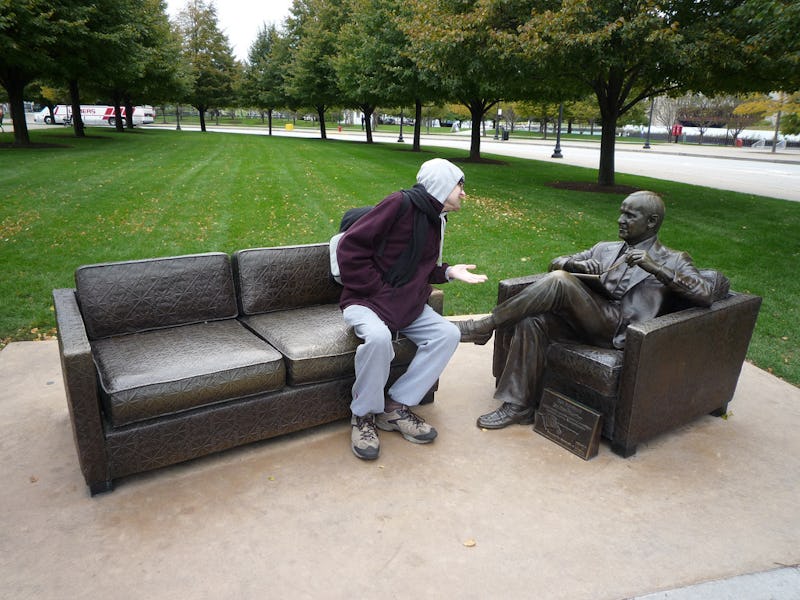Learning Psychotherapy at Fairfield University: This Week's Saturday Syllabus
Take a class without having to go to school.

Earlier this week we highlighted the secret FBI file of legendary sci-fi writer Ray Bradbury, which reminded us of a quote he once had about higher education. “I spent three days a week for 10 years educating myself in the public library, and it’s better than college,” he said. “People should educate themselves — you can get a complete education for no money. At the end of 10 years, I had read every book in the library and I’d written a thousand stories.” You hear that kids!? Ray Bradbury didn’t have to go to school and you don’t have to either!
If you dig Bradbury’s ethos on skipping college but still want to stay informed, then why not start with the graduate syllabus from Fairfield University in Connecticut below? Who knows, you might learn something.
Class: Theories of Counseling and Psychotherapy
Professor: Dr. Diana Hulse
Catalogue Description: “This course examines philosophical bases for counseling theory, ethical and professional issues and eight to nine theories that contribute to the practice of professional counseling, including psychoanalytic, humanistic/existential, cognitive/behavioral, and systemic approaches.”
Course Description: “The major assumption underlying this survey graduate course is that one’s efforts as a counselor are likely to be enhanced if they are based upon a carefully developed personal theory of counseling rather than upon vague notions and ideas. Another assumption of this course is that one’s beliefs and biases about people influence therapeutic work. Just as the major theories have evolved from a set of beliefs about people and the world so does a counselor’s choice of theoretical approaches and techniques.
“In this course we will examine different theoretical approaches and discuss their usefulness as we explore contemporary issues in our technological world including race, ethnicity, gender, class, physical disability, and sexual orientation. The first step in this journey is to become acquainted with each theory; to know its origins and its beliefs about how people behave. Only after careful study are we in a position to say what might work with a particular client and what might not work.
“As you read and interact with the various individual and systems theories you will have the opportunity to think, question, react, agree, disagree, and generally increase your ability to puzzle about human behavior. We will engage in class activities by keeping in mind ethical considerations, current research, and the pervasive presence of culture.
Course Objectives: “Through lecture, discussion, written case analyses, demonstrations, and debates students will:
1. Learn basic assumptions and principles underlying major individual theories and system theories;
2. Analyze major counseling theories, from both individual and systems perspectives;
3. Differentiate the characteristics of major counseling theories;
4. Learn current research on the application of different counseling theories;
5. Apply counseling theory to case material;
6. Examine ethical and diversity considerations relevant to the application of theoretical models;
7. Examine personal biases, beliefs, attitudes, and the worldviews and their impact on one’s work as a counselor.
Required Text: Sharf, R.S. (2012) Theories of Psychotherapy & Counseling: Concepts and Cases (5th ed.). Brooks/Cole.
Required Readings: Brooks, D. (2011, March 8). The New Humanism. The New York Times.
Hansen, J.T. (2010, Oct 1). Extending the Humanistic Vision. Counseling Today.
Horney, K., & Ingram, D.H. (1987). Fina Lectures. New York: W.W. Norton & Company, Inc. (Wholeheartedness, Comprehensiveness, and Productiveness)
Recommended Readings: Donigan, J. & Hulse-Killacky D. (1999) Critical Incidents in Group Therapy (2nd Ed.) Brooks/Cole. This text, while focused on group therapy, introduces a number of individual theories by practitioners of these theories including a discussion of systems approaches.”
One of the pleasures of sifting through syllabi is the window they grant, if ever so slight, into the future of a profession. To that end, this is a look at how we may be describing our marriages on a couch one day. The what of psychotherapy is opaque; almost none of us outside the professions truly knows how they do it. Granted, this is a graduate course made up of students who have a good grasp on that sort of thing, but this syllabus is a view of the inside.
It’s telling that the course stresses the personal investment of the student into the theories being thrown around. That flippant notion seems second nature on the outset, but being personally involved in the psychotherapy of a patient is the fundamental step in creating a relationship that could change the life of a person in need. That’s no small feat. Maybe I’m reading too much into this simple psych class, but the syllabus makes it seem like it’s setting the bedrock for the important principles that come later for aspiring psychotherapy counselors.